Securing a skilled Enterprise Architect is a game-changer for organizations aiming to streamline their IT infrastructure and drive digital transformation. However, many companies struggle with understanding the full scope of this role and identifying the right skill set. An Enterprise Architect not only designs and manages complex IT systems but also bridges the gap between a company’s technology capabilities and its business objectives. Missteps often occur when companies focus solely on technological competencies, overlooking the strategic vision, communication, and leadership skills that are truly necessary.
This article provides a practical guide to hiring an Enterprise Architect, covering their role, skills, job description crafting, and where to find top candidates. We also discuss the importance of skills assessments and understanding key differences between Enterprise Architects and Solution Architects. For more insights, check our blog on skills required for Enterprise Architects.
Table of contents
What does an Enterprise Architect do?
An Enterprise Architect is responsible for aligning an organization's IT strategy with its business goals. They create a holistic view of the company's IT systems and processes, ensuring they work together seamlessly to support the overall business objectives.
The day-to-day tasks of an Enterprise Architect include:
- Developing and maintaining the enterprise architecture framework
- Analyzing current IT systems and recommending improvements
- Collaborating with stakeholders to understand business needs
- Designing scalable and flexible IT solutions
- Overseeing the implementation of new technologies and systems
- Ensuring compliance with industry standards and regulations
- Providing guidance on IT governance and best practices
Skills and qualifications to look for in an Enterprise Architect
When hiring an Enterprise Architect, it can be tricky to distinguish between necessary skills and what might just be helpful. It's a common pitfall to overload the candidate profile with non-essential qualifications. To build a well-rounded profile, it's crucial to differentiate between required skills and preferred qualifications.
For this role, a solid foundation in IT and business processes is imperative. Look for a Bachelor's degree in Computer Science or a related field and 7+ years of experience in similar roles. A strong grasp of enterprise-wide architecture frameworks and excellent communication and stakeholder management skills are also key.
On the preferred side, candidates with a Master's degree or certifications like TOGAF can stand out. Experience with cloud platforms and familiarity with emerging technologies such as AI and blockchain could be beneficial. Understanding agile methodologies and DevOps practices can also add value.
| Required skills and qualifications | Preferred skills and qualifications |
|---|---|
| Bachelor's degree in Computer Science, Information Technology, or related field | Master's degree in Computer Science, Business Administration, or related field |
| 7+ years of experience in enterprise architecture or related roles | Certifications such as TOGAF, Zachman, or equivalent |
| Strong understanding of business processes and IT strategy alignment | Experience with cloud computing platforms (AWS, Azure, GCP) |
| Proven experience in developing and implementing enterprise-wide architecture frameworks | Knowledge of emerging technologies like AI, IoT, and blockchain |
| Excellent communication and stakeholder management skills | Experience in agile methodologies and DevOps practices |
How to Write an Effective Enterprise Architect Job Description
Once you've defined the ideal candidate profile for your Enterprise Architect role, the next step is crafting a compelling job description to attract top talent. Here are some key tips to make your Enterprise Architect job description stand out:
- Highlight strategic responsibilities: Clearly outline the role's impact on aligning IT strategy with business goals. Emphasize tasks like developing enterprise architecture frameworks and guiding technology decisions.
- Balance technical and soft skills: While technical expertise is important, don't forget to mention soft skills like leadership, communication, and stakeholder management. These are crucial for an Enterprise Architect's success.
- Showcase growth opportunities: Highlight unique aspects of your company and the role, such as cutting-edge projects or opportunities for professional development. This can help attract ambitious candidates looking for meaningful work.
Top Platforms to Find Enterprise Architects
Now that you have a detailed job description, it's time to post it on job listing sites to source qualified Enterprise Architect candidates. These platforms are crucial in reaching a wide range of professionals, ensuring you find the right fit for your organization's needs.
LinkedIn Jobs
Ideal for posting full-time Enterprise Architect positions. Offers extensive reach and allows detailed job descriptions with specific requirements.

Dice
Specialized in tech jobs, perfect for finding experienced Enterprise Architects. Allows for detailed technical requirements in job listings.
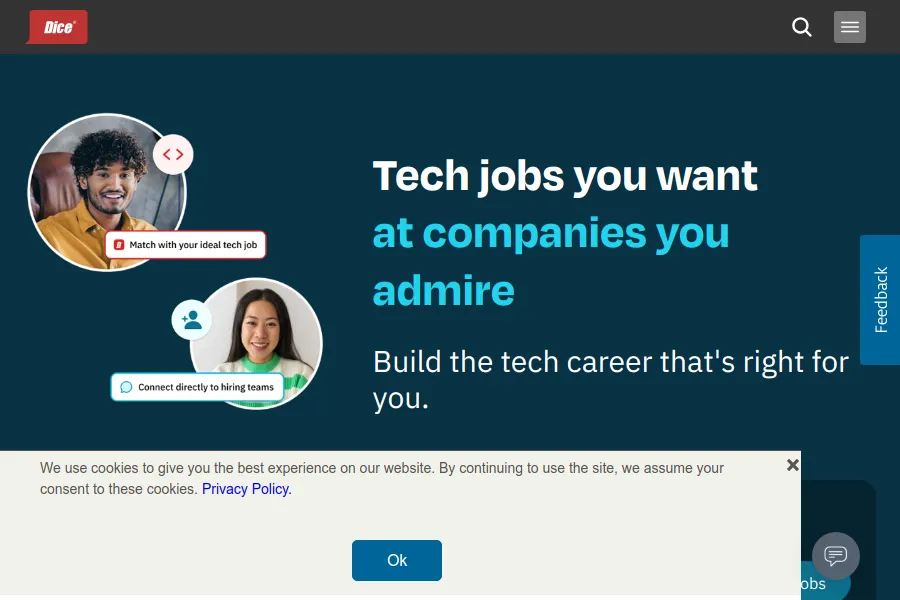
Indeed
Great for reaching a broad audience of potential Enterprise Architects. Offers options for sponsored job postings to increase visibility.

The remaining platforms offer various benefits tailored to different hiring needs. Whether you're looking for freelance architects on Toptal or exploring industry-specific candidates on the IIBA Career Center, these sites have got you covered. Platforms like Upwork are excellent for project-based roles, while Robert Half Technology offers staffing services for a more hands-on approach. Don't forget Stack Overflow Jobs for tech-focused listings and Glassdoor to highlight your company culture alongside job postings.
Keywords to Look for in Enterprise Architect Resumes
Resume screening is a key step in finding the right Enterprise Architect. It helps you quickly identify candidates with the most relevant skills and experience before moving to interviews.
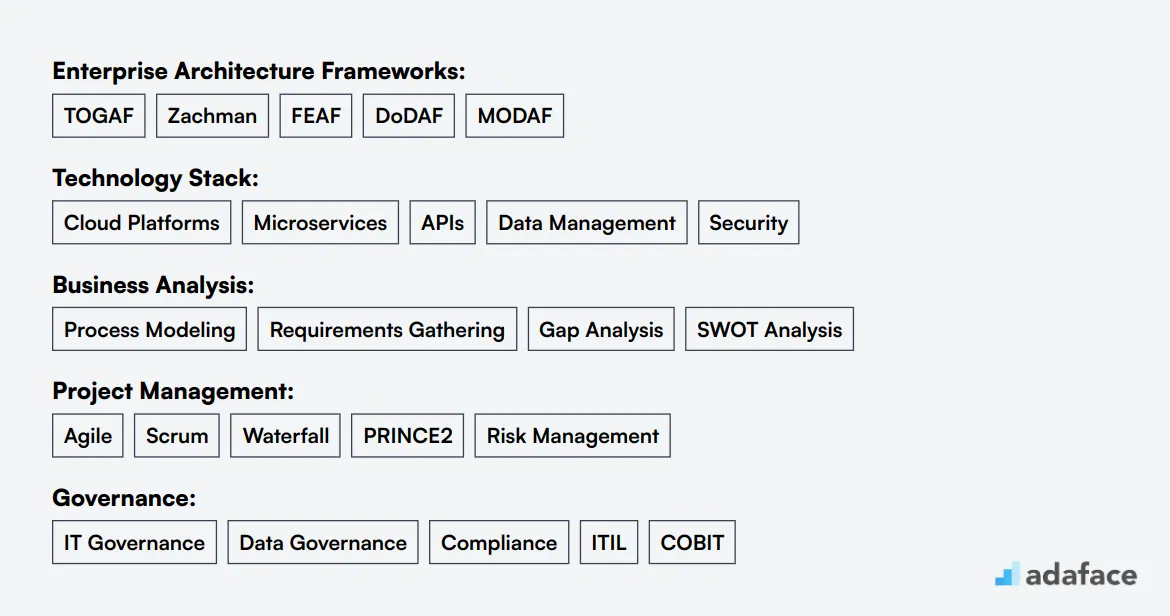
When manually screening resumes, focus on key terms like 'TOGAF', 'cloud platforms', and 'business process modeling'. Look for candidates who have experience aligning IT strategies with business goals and implementing enterprise-wide architecture frameworks.
AI tools can speed up resume screening. You can use ChatGPT or similar AI to analyze resumes based on your specific criteria. This approach can save time and help ensure you don't overlook qualified candidates.
Here's a sample prompt for AI-assisted resume screening:
TASK: Screen resumes for Enterprise Architect role
INPUT: Resumes
OUTPUT: For each resume, provide:
- Name
- Matching keywords
- Score (out of 10)
- Recommendation
- Shortlist (Yes/No/Maybe)
KEYWORDS:
- Enterprise Architecture (TOGAF, Zachman)
- Cloud Platforms (AWS, Azure, GCP)
- Business Process Modeling
- IT Governance
- Stakeholder Management
Customize this prompt based on your specific job requirements and company needs.
Which skills tests should you use to assess Enterprise Architects?
Enterprise Architects need a unique blend of technical and strategic skills for effective decision-making and system design. Using skills tests allows recruiters to objectively evaluate these skills and ensure candidates meet the demands of the role.
Software System Design Test is a great tool to assess an Enterprise Architect's ability to design scalable and efficient systems. This test evaluates the candidate's understanding of system requirements, architecture styles, and best practices. Learn more about the Software System Design Test.
Assessing a candidate's understanding of cloud environments is critical. The Cloud Computing Test helps determine if they can effectively leverage cloud solutions and implement strategies suitable for your organization. Explore the Cloud Computing Test to ensure your candidate is proficient.
Data Modeling Test is essential for evaluating how well an Enterprise Architect can represent the data structures necessary for software operations. It ensures candidates can create logical and physical data models that support business processes. Discover the benefits of the Data Modeling Test.
Verify your candidate's ability to work within Microsoft environments using the Azure Test. This test assesses knowledge of Azure services and deployment strategies, crucial for system architects working with Microsoft technologies. Check out the Azure Test for detailed insights.
Finally, the Solution Architect Test helps determine a candidate's capability to design holistic solutions that align with the business needs. This test evaluates strategic thinking, design patterns, and technology choices. Uncover the potential of candidates through the Solution Architect Test.
How much does it cost to hire an Enterprise Architect?
Hiring an Enterprise Architect can be a significant investment, with salaries differing greatly by country and city. In the United States, the average salary is approximately $152,700, with variations based on location. In India, salaries range widely with tech hubs like Bengaluru offering around INR 1,559,002. For Australia, the median salary stands at roughly AUD 157,077. Similarly, in Canada, the average salary is around CAD 129,145. Understanding these variations can help recruiters tailor competitive compensation packages.
Enterprise Architect Salary in the United States
The average salary for an Enterprise Architect in the United States is approximately $152,700. Salaries can vary significantly based on location, with the lowest reported salary around $104,700 and the highest reaching $207,400.
For instance, in major cities like Chicago, IL, the average salary is about $170,200, while in New York, NY, it can go up to $164,700. Recruiters should consider these variations when setting compensation packages.
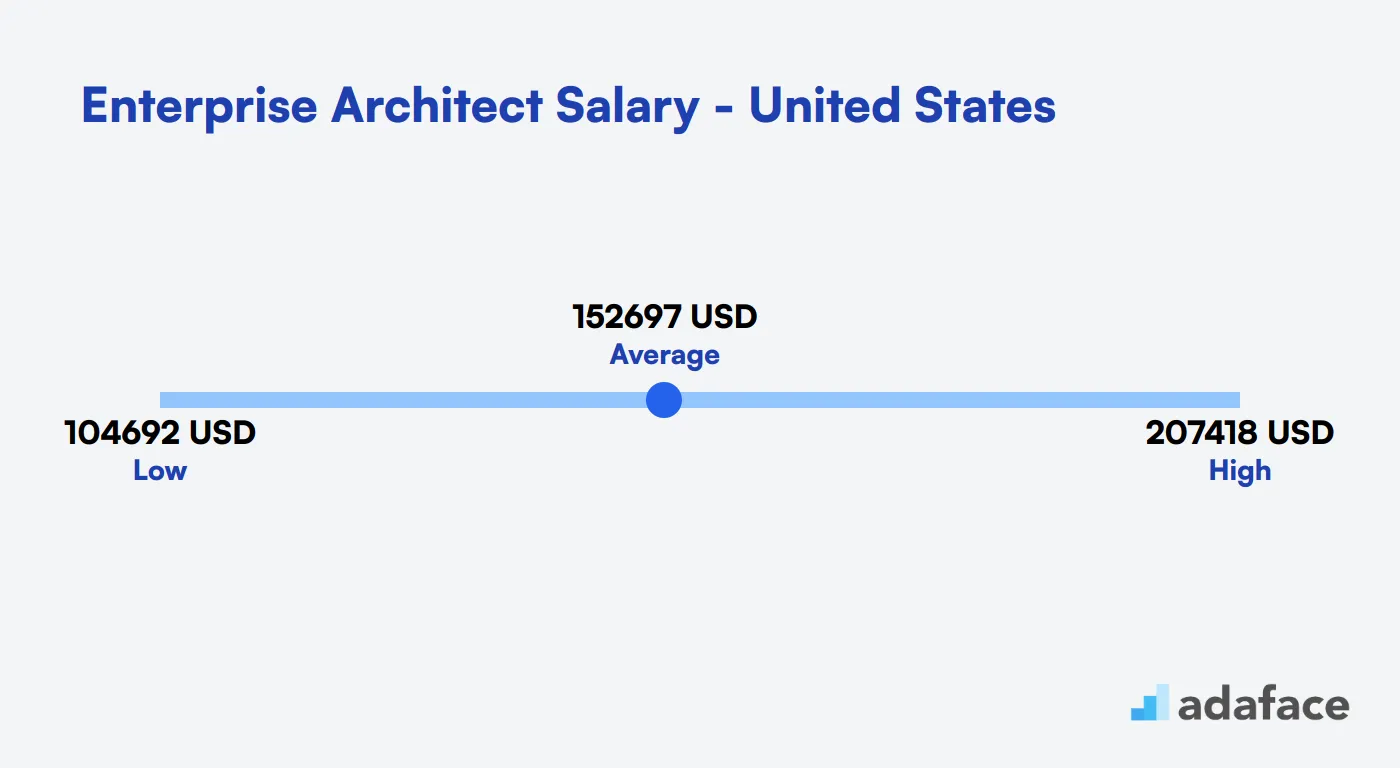
Enterprise Architect Salary in the United Kingdom
Enterprise Architects in the UK command competitive salaries due to their strategic role in organizations. The average salary for this position ranges from £70,000 to £120,000 per year, depending on experience and location.
London-based Enterprise Architects typically earn on the higher end of this scale, often exceeding £100,000 annually. Factors influencing salary include industry sector, company size, and the individual's expertise in specific technologies or domains.
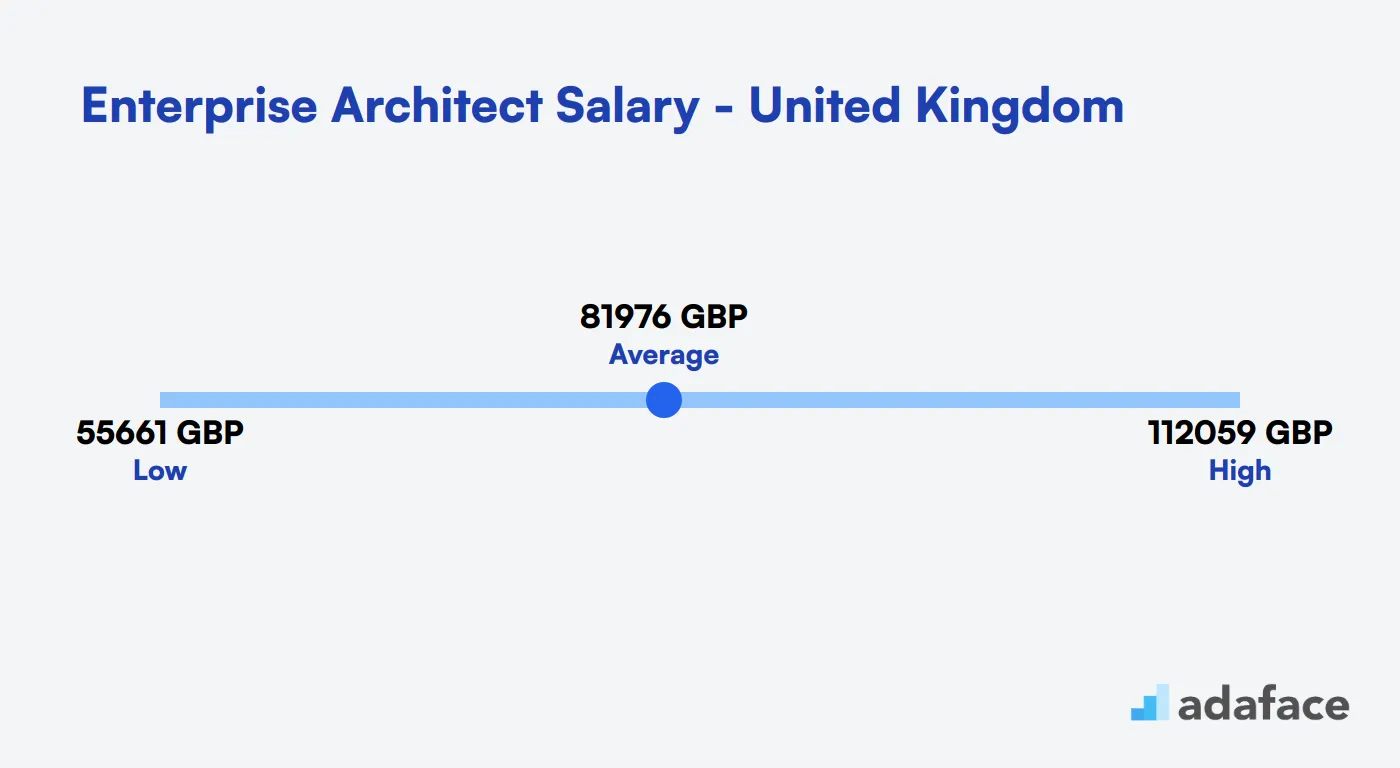
Enterprise Architect Salary Australia
In Australia, the typical salary for an Enterprise Architect varies across different cities. On a national level, the average ranges from AUD 115,086 to AUD 214,389, with a median of approximately AUD 157,077. Notably, Canberra offers some of the highest salaries, with the average ranging from AUD 175,278 to AUD 283,737. Meanwhile, cities like Melbourne provide a lower range, with salaries between AUD 92,298 and AUD 162,092.
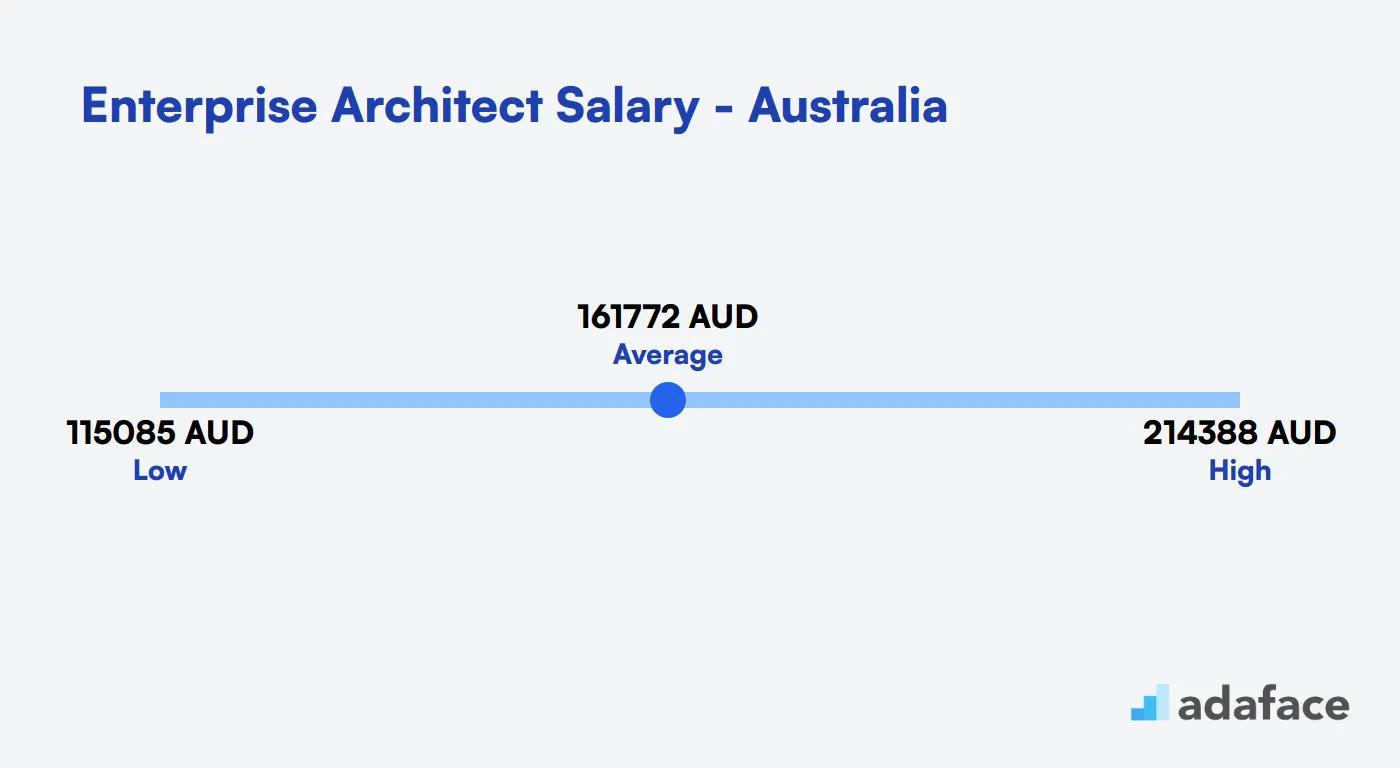
Enterprise Architect Salary in Canada
The average salary for an Enterprise Architect in Canada is around CAD 129,145. Salaries can range from a low of CAD 95,181 to a high of CAD 166,996, depending on the location and experience. For instance, in Montréal, salaries can climb up to CAD 228,121, while in Scarborough, they might be closer to CAD 103,202.
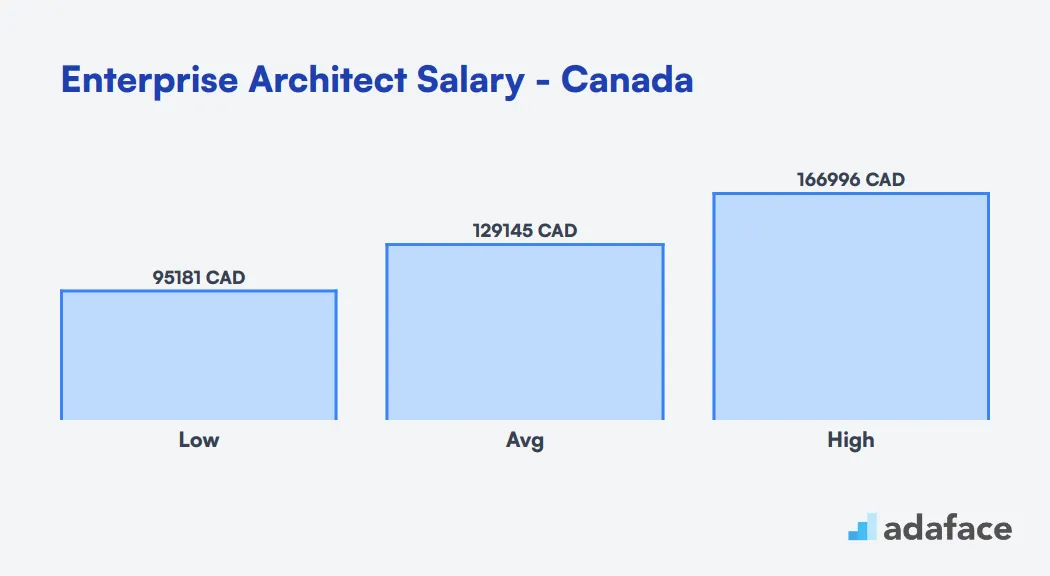
Enterprise Architect Salary in India
Enterprise Architects in India earn diverse salaries depending on their location. In cities like Kolkata and Gurgaon, the average salary is around INR 1,800,000. Bengaluru, known as India's tech hub, offers an average of INR 1,559,002. Chennai and Kochi also offer competitive salaries averaging INR 1,510,000. Mumbai, despite its high cost of living, offers an average salary of INR 1,106,818, which is on the lower end compared to other major cities.
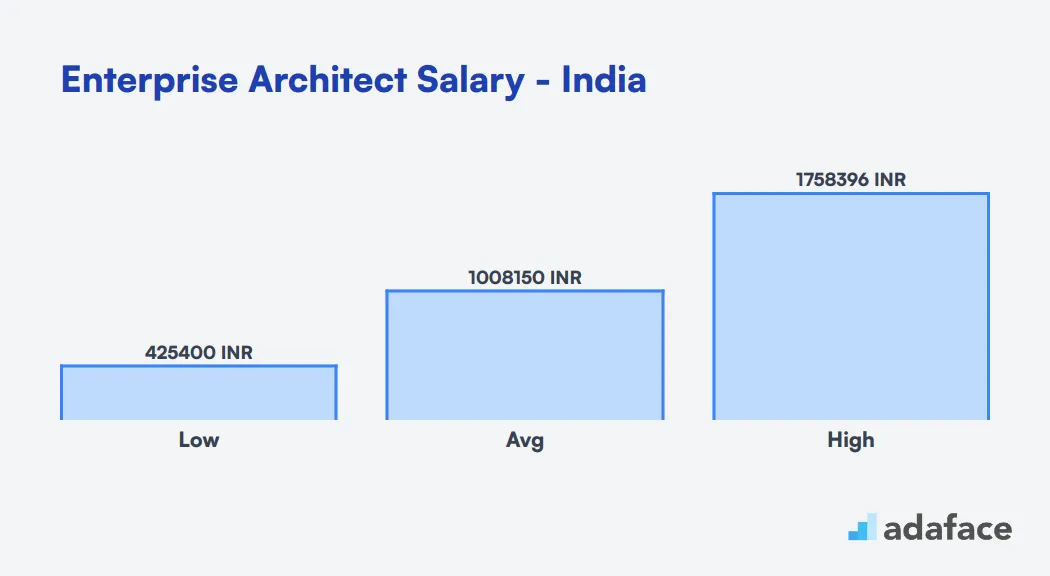
What's the difference between an Enterprise Architect and a Solution Architect?
Many people confuse the roles of an Enterprise Architect and a Solution Architect because both involve working with technology to meet business needs. However, the scope and focus of these positions are quite distinct.
An Enterprise Architect operates at an organization-wide level, emphasizing long-term strategic alignment and planning that spans across multiple projects and departments. They interact primarily with C-level executives and business leaders, possessing broad knowledge across various domains to create enterprise architecture frameworks and roadmaps that might span 3-5 years or more.
In contrast, a Solution Architect focuses on specific projects or domains, concentrating on tactical implementation and system design. Their interactions are mostly with project managers and development teams, requiring deep expertise in particular technologies. Deliverables include detailed system designs and technical specifications that align with the current project lifecycle.
| Enterprise Architect | Solution Architect | |
|---|---|---|
| Scope | Organization-wide | Project or domain-specific |
| Focus | Strategic alignment and long-term planning | Tactical implementation and system design |
| Stakeholder Interaction | C-level executives and business leaders | Project managers and development teams |
| Technical Depth | Broad knowledge across multiple domains | Deep expertise in specific technologies |
| Deliverables | Enterprise architecture frameworks and roadmaps | System designs and technical specifications |
| Time Horizon | 3-5 years or more | Current project lifecycle |
| Business Acumen | High, with focus on business strategy | Moderate, with focus on project objectives |
| Governance Role | Define and enforce enterprise-wide standards | Ensure project compliance with standards |
Hire the Best Enterprise Architects for Your Team
In this blog post, we discussed the roles and responsibilities of an Enterprise Architect, the qualifications and skills to look for, and effective ways to craft job descriptions. We also explored platforms to find qualified candidates and the differences between Enterprise Architects and Solution Architects.
The key takeaway is to focus on creating accurate job descriptions and using appropriate skills tests to ensure you hire the right candidate. Using assessments like the Solution Architect Test can help validate a candidate's capabilities and expertise in system design and architecture. By honing in on these essential steps, you can successfully build a strong team of Enterprise Architects tailored to your organization's needs.
System Design Online Test
FAQs
An Enterprise Architect is responsible for aligning IT strategy with business goals, designing IT systems architecture, and guiding technology implementations.
Look for skills in strategic thinking, IT system design, leadership, communication, and a strong understanding of industry standards and technologies.
Focus on outlining the core responsibilities, required skills, qualifications, and the strategic impact the role will have on your organization.
Consider professional networking sites, specialized job platforms, and collaborating with recruitment agencies focused on IT roles.
Enterprise Architects focus on aligning IT strategy with business goals, while Solution Architects specialize in designing specific solutions within an enterprise’s architecture.
Consider using skills assessments, technical interviews, and case studies to evaluate a candidate’s abilities effectively.
Challenges include understanding the broad scope of the role, the strategic mindset required, and the need for cross-departmental collaboration skills.

40 min skill tests.
No trick questions.
Accurate shortlisting.
We make it easy for you to find the best candidates in your pipeline with a 40 min skills test.
Try for freeRelated posts
Free resources



